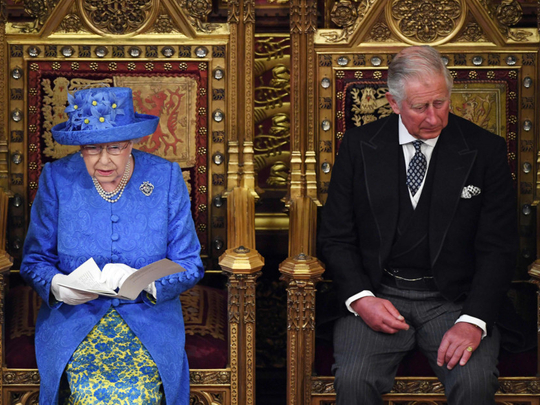
If I were a Tory MP, I’d have listened to the Queen’s speech with an unease that turned steadily into panic.
It’s not just that I’d have heard the first such address in many decades to be delivered by a government with no majority in the House of Commons. On that score, I’d comfort myself that the Democratic Unionist Party (DUP) will come on side eventually: Deal or no deal, they’re surely not going to vote down British Prime Minister Theresa May, thereby handing the keys to No 10 to Labour party leader Jeremy Corbyn, a long-time sympathiser with the DUP’s republican arch-enemies in Northern Ireland. Even if the DUP abstains, that will be just enough for May to squeak home.
No, what would be worrying me would be the speech itself. I’d have some concerns about what was in it: A Brexit monomania that confirms the Conservatives have become a single-issue party, setting out a programme dominated by multiple Brexit bills along with the grandiosely titled great repeal bill .
But mainly I’d be alarmed at what was not in it. Sure, I’d be relieved that the retro absurdity of a return to grammar schools has been dropped, seeing that as the silver lining to the cloud of May’s failure to win an overall majority on June 8. But that small absence would be little comfort compared to the larger absences alongside it.
For what did the election less than a fortnight ago tell the Conservative party? For one thing, it said — loud and clear — that Britons have had enough of austerity. That they’re fed up that a policy initially billed as a temporary belt-tightening has become a permanent way of life, with no end in sight. They’re sick and tired of seeing cherished public services — whether schools or policing — starved of cash. They don’t like libraries being closed down or once-noisy children’s centres lying empty or stories of nurses visiting food banks and teachers having to bring food in for hungry pupils. They have had the seven lean years and now they want it to end. Yet the agenda laid out by the monarch promised little to address any of that.
But if the Tories are not to be driven from power, they are going to have to respond to this shift in public mood.
If I were a Tory MP my worry about all this would be direct and self-interested. I’d have seen how even apparently safe Tory seats fell to Labour — Kensington, Canterbury — and I’d want to know that the party was ready to act to save its skin. Very specifically, I’d be looking at the rise in youth turnout, up to 64 per cent among the under-24s, according to an Ipsos Mori analysis. I’d notice the numbers by which those voters overwhelmingly backed Labour and I’d be thinking that the Tories need to do something to stem that youth tide — urgently.
Some of the more thoughtful Conservatives are already making noises in this direction. George Freeman MP, chair of the Conservative Policy Forum, has called for a positive vision to rival Corbyn’s talk of hope and “a new deal for a new generation”. He say: “We need to signal that we ‘get’ the exhaustion with austerity.” He wants a hard look at the interest rates currently charged on student loans and suggests a cross-party commission on intergenerational fairness, as well as moves to help millennials build up a nest-egg of savings.
If I were one of Freeman’s parliamentary colleagues I’d be thinking that the Tories are going to have to go a lot further than that. They surely need to match Labour’s direct promise to abolish tuition fees altogether. Yes, it’s transactional. Yes, it will easily be derided as a bribe. And yes, it may prove insufficient to neutralise Labour’s advantage among the young. But unless Conservatives are happy to write off a group that accounted for 10 per cent of the electorate two weeks ago, it is necessary. But there was no hint of it in the Queen’s speech. And no serious action on housing either.
At the other end of the age spectrum, plenty of Tories will have been relieved that there was, of course, no mention of the proposal that killed their election campaign: The “dementia tax”. (Instead, the Queen spoke only of a “consultation” on social care.) But the surge in youth turnout was complemented by a small, but marked decline in turnout among the elderly: The bedrock of the Conservative base. To win back their enthusiastic support, the Tories will surely have to maintain the giveaways that May tried to drop: The triple lock on pensions and the universal winter fuel allowance.
It’s true that all this will cost big money. So will restoring police numbers, essential to reassure public opinion after a summer of terror attacks. So will replenishing local government, whose culture of outsourcing to save cash has been exposed by the Grenfell Tower disaster. All of it will cost and all of it will have to be paid for somehow — including by raising taxes on the wealthiest. But if the Tories are not to be driven from power, they are going to have to respond to this shift in public mood. The alternative is to be branded forever as the party of meanness and neglect of the public realm, in an era when people are hankering for something better.
This is what the Queen’s speech needed to say, but didn’t. It didn’t chart a way out of the hole the Tories are in. Indeed, it suggested they don’t even realise how deep that hole is.
— Guardian News & Media Ltd
Jonathan Freedland is a weekly columnist and writer for the Guardian.












